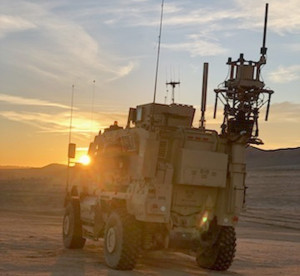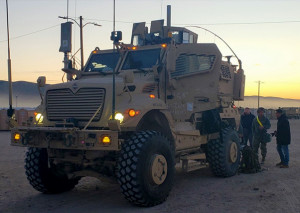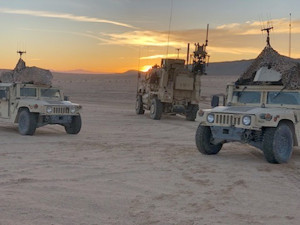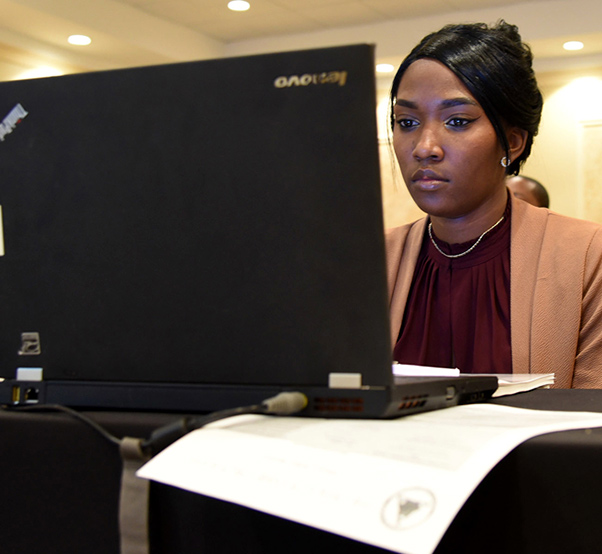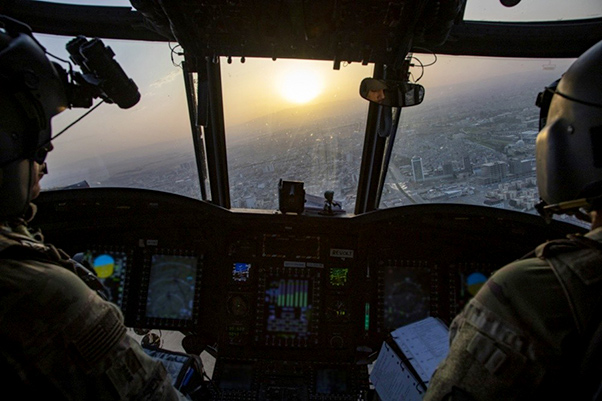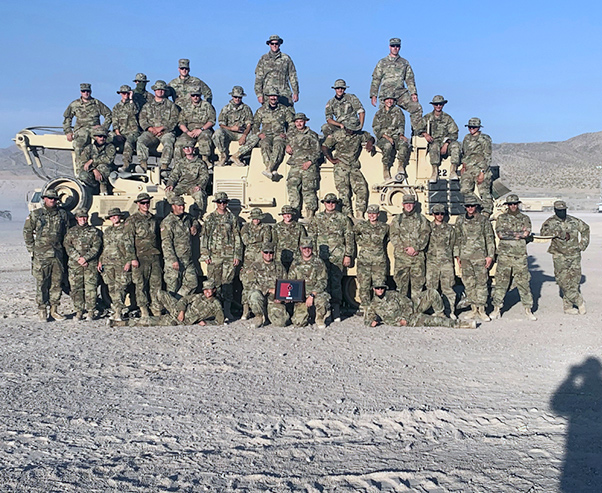The Army’s newest electronic warfare vehicle was tested at the Army’s toughest training ground, the National Training Center in Fort Irwin, Calif., in January. Electronic Warfare Soldiers from 3rd Armored Brigade Combat Team “Greywolf,” 1st Cavalry Division conducted electronic attack and electronic support operations during the month-long exercise using the Electronic Warfare Tactical Vehicle.
The Army’s newest electronic warfare vehicle was tested at the Army’s toughest training ground, the National Training Center in Fort Irwin, Calif., in January.
Electronic Warfare Soldiers from 3rd Armored Brigade Combat Team “Greywolf,” 1st Cavalry Division conducted electronic attack and electronic support operations during the month-long exercise using the Electronic Warfare Tactical Vehicle.
“Our main purpose was to provide support by denying communications to the enemy, jamming comms,” said Sgt. First Class Cristian Holguin, the EWTV team leader. “In addition we were able to listen in on FM communications from the enemy and detect enemy electronic signatures to use for call for fire missions.”
The brigade received the Army’s first dedicated electronic warfare vehicle in September of 2018 in time to test it out during the Brigade’s external evaluation, Pegasus Forge III, at Fort Hood, Texas. The team then provided feedback to the team at the Rapid Equipping Force, which had developed the vehicle.
“It’s like version one of the system. And for being version one it is a very good system,” said Holguin. “The folks at REF listened to our feedback following Pegasus Forge and actually were making upgrades to the vehicle as we were on ground at NTC.”
According to Staff Sgt. Darron McCracken, a EWTV operator, the shortened timetable between Pegasus Forge and NTC presented a challenge to the team, but they were able to overcome them and help integrate the system fully at the brigade and battalion-levels.
The Electronic Warfare Team from 3rd Armored Brigade Combat Team, 1st Cavalry Division along with members of the Rapid Equipping Force prepare the Electronic Warfare Tactical Vehicle for operation at the National Training Center in Fort Irwin, Calif. The new vehicle was developed to provide Army Electronic Warfare Teams with the ability to detect and attack in the electromagnetic spectrum from an operationally relevant range at the brigade combat team level.
“Initially the battalions were a little skeptical of the system. Not only was it an asset they had to provide forces to help protect, but it’s a pretty big vehicle as well,” he said. “But once they saw what it could do and they benefited from its effects, they recognized the benefits of the system.”
The near-peer enemy along with the terrain and elements that the Brigade faced at NTC made it an ideal environment to test the EWTV. Once the force-on-force fight was completed, the team conducted situational training that helped further test the capabilities of the vehicle.
“We worked on finding ways to better improve our jamming and detection capabilities,” said Staff Sgt. Francisco Becerra, a EWTV Operator. “For instance, we learned by raising the antenna two more inches we were able to getter better lines of bearing. These are things that you can’t necessarily test out in the middle of a fight.”
Measuring the performance of the vehicle at NTC was sometimes difficult to do since there was no immediate feedback through real time measures and sensors. According to Holguin it is something that NTC is working to improve, however they were able to validate and measure effects in other ways.
“There are two aspects of performance. Performance of the equipment and performance of the teams themselves,” Holguin said. “And I think we’ve accomplished more than we expected for integration and employment; having and using the EWTV validated our position as an effective asset on the battlefield.”
The Army’s newest electronic warfare vehicle, the EWTV (center) was tested in conjunction with other EW equipment to include the VROD (Versatile Radio Observation & Direction) and VMAX systems (seen mounted on the Humvees) at the National Training Center, Fort Irwin, Calif. Electronic Warfare Soldiers from 3rd Armored Brigade Combat Team “Greywolf,” 1st Cavalry Division conducted electronic attack and electronic support operations during the month-long exercise using the Electronic Warfare Tactical Vehicle.
Greywolf was the first to test the vehicle in an austere environment against a near-peer foe, but they won’t be the last. The EWTVs belong to III Corps and are being moved to other units so that their teams can test them and add their inputs to improve the system.
“The intent is to take all of the lessons learned and build on it,” said McCracken. “Towards the end of the process we will have an SOP, something that is predictable and can be translated across the Army.”
When asked if, after testing it out at NTC, they felt it was an effective system, McCracken answered, “Absolutely. Absolutely.”
The new vehicle was developed to provide Army Electronic Warfare Teams with the ability to detect and attack in the electromagnetic spectrum from an operationally relevant range at the brigade combat team level. It was developed by the Rapid Equipping Force to give the Army’s Brigade Combat Team a dedicated electronic warfare vehicle.






